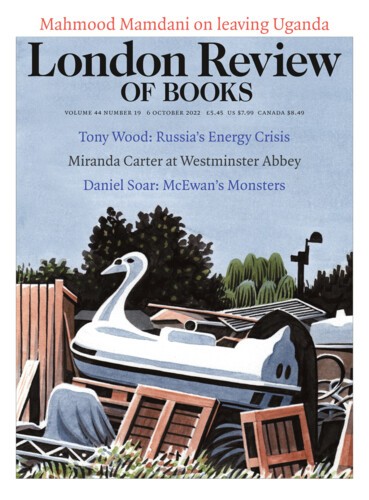The Dallas Penn I knew was always figuring out new ways to use the internet, blogging and vlogging (about Ghetto Big Macs, bodegas, baseball stadiums, sneakers) before blogging or vlogging were much of a thing, and co-hosting a pioneering hip-hop podcast, the Combat Jack Show. He’d come a long way from his stomping grounds but never forgot them or left them behind.
Alex Abramovich
Alex Abramovich is writing a book about the history of American music.
A meme bounced around Brooklyn last summer: ‘What if we kissed at the Tom Verlaine book sale?’ Verlaine, who formed and fronted the band Television, died on 28 January 2023. Over the years he had acquired fifty thousand books.
Robert Johnson’s Complete Recordings came out in the summer of 1990. It sold so well that the phrase on a sticker attached to the cellophane became inextricable from Johnson’s legend: ‘This is where it all began.’ Bad history maybe, but good marketing.
Dixie Peach Pomade: In the Room with Robert Johnson
Alex Abramovich, 6 October 2022
The blues queens of the 1920s toured far and wide and sold millions of records. Their ‘empress’, Bessie Smith, appeared on Broadway and in movies. After her death in 1937, a memorial concert was held at Carnegie Hall. But Smith’s country cousins – ‘walking musicians’ – were lucky if they got recorded at all. ‘They were the offside,’ the...
The first Siege of Sevastopol – a belated response to Russia’s first annexation of Crimea – took place in 1854-55. Tolstoy wrote about it in Sebastopol Sketches. Mark Twain referred to the battles in Innocents Abroad. Poems were written, paintings painted; eventually, movies were made. In 1856, Henry Worrall, a musician and artist, published ‘Sebastopol’, a ‘descriptive fantasie’ for the parlour guitar. ‘This piece is intended as an imitation of military music,’ he wrote. ‘The Harmonics in single notes imitate the Bugle. The Harmonics in chords imitate a Full Military Band at a distance.’ Readers were instructed to retune their instruments:
Podcasts & Videos
‘The categories are stupid’
Alex Abramovich and Thomas Jones
Alex Abramovich talks to Thomas Jones about the history of country from Jimmie Rodgers to Lil Nas X, by way of Dolly Parton (and Eddie Van Halen), and the problems with the labels that get applied to American...
Read anywhere with the London Review of Books app, available now from the App Store for Apple devices, Google Play for Android devices and Amazon for your Kindle Fire.
Sign up to our newsletter
For highlights from the latest issue, our archive and the blog, as well as news, events and exclusive promotions.


